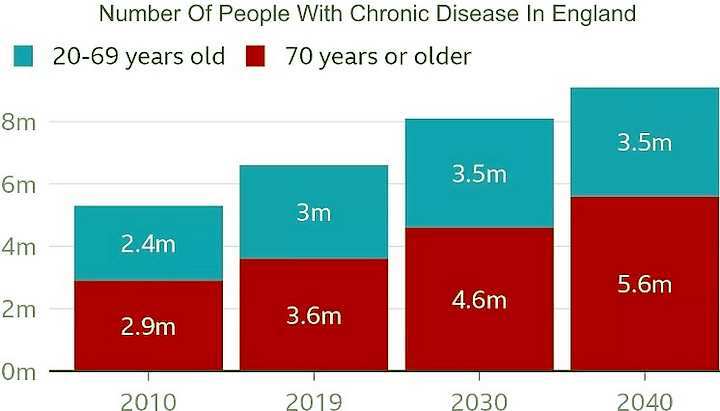 In July 2023, The Health Foundation published projections on chronic disease in England, other parts of the UK may see a similar picture.
In July 2023, The Health Foundation published projections on chronic disease in England, other parts of the UK may see a similar picture.
The number of people living with serious illness is expected to rise far faster than our healthy, working age population. With the latter needing to support the former, a growing imbalance is evident.
A change with the potential to have a major impact on healthcare, on wider society and the economy. Support costs could take government borrowing to unprecedented levels, while the nation’s income falls.
As difficult as this sounds, there are solutions we can all help to achieve, with the nature of the problem becoming clear.
Conditions Of Concern
Medical conditions expected to cause the most ill health going forward are:
- Chronic pain
- Diabetes
- Anxiety or depression
- Cancer
- Chronic kidney disease
- Atrial fibrillation
- Chronic pulmonary disease
- Heart failure
- Constipation
- Dementia
They are in order of projected volume, with large increases likely in anxiety and depression, chronic pain, or diabetes. Cost and complexity of caring for each may place them in a different economic, or practical order.
A heart condition is a great concern but once identified and treated, may require less support than dementia, or chronic pain.
Neither are all increasing diseases listed, skin cancer comes to mind from our perspective. Heightened sun exposure over decades, social changes and a longer living population will see this continue to grow.
Accept Or Bring Change
The Health Foundation’s data has brought wide ranging views on reasons for the projected rise. Obesity is high on the list, societal change, including computer use and social networks, a deficient diet, lack of physical activity.
Analysing society and altering the way we live is a complex task, as is providing the care needed even if we do gradually achieve change. A requirement for more community based support is clear.
We could simply accept and if feasible, plan for this development, or give an equal focus to ways we can alter the future.
Personal Action
The solution to a large scale problem can in part lie with individuals and this is the case with health, where we can all take action.
Ignoring misinformation helps, such as suggestions that giving up smoking is the reason for obesity. Over time, more people quitting lose weight than gain weight, due to a healthier lifestyle and for others, the risk is still well below smoking.
Cutting through marketing of poor foods as attractive, or healthy is worthwhile, as is accepting a natural need. Our bodies respond well to exercise, with the lack of this flagged as the prime cause of chronic disease in several countries.
By caring for ourselves, we assist in a transition to preventative care which is essential, as is treating disease before this becomes chronic.
Not Ignoring Symptoms
Skin cancer is renowned for responding well to early treatment, the same could be said of other skin diseases and many medical conditions. Neither are they separate, just because they appear as items in a list.
Seeking early diagnosis and treatment for one condition prevents wider physical and psychological outcomes they can bring. The chronic diseases we could suffer from never take hold, because we took action.
With pressures on healthcare this may seem a contradiction but is not. An effective way to reduce chronic ill health is early treatment.
We should prepare to meet changing health and social care needs, yet still work to prove the forecast wrong. A medical dermatologist, or any clinician shouldn’t feel you came to see them too early, when this is the best route for you and them.
